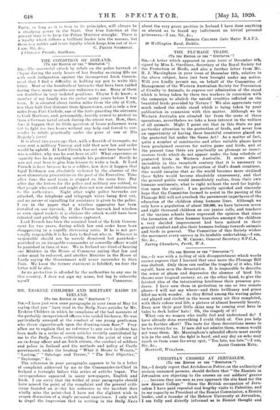THE PLUMAGE TRADE. "
[To THE EDITOR OF THE " SPECTATOR.") Sia,—A letter which appeared in your issue of December 6th, signed by Miss L. Gardiner, Secretary of the Royal Society for the Protection of Birds, and also a further letter from Mr. H. J. Massingham in your issue of December 13th, relative to the above subjeot, have just been brought under my notice. Will you kindly permit me, on behalf of the Committee of Management of the Western Australian Society for Prevention of Cruelty to Animals, to express our admiration of the stand which is being taken by these two workers in connexion with the campaign to abolish the untold cruelties inflicted on the beautiful birds provided by Nature ? We also appreciate very much indeed the noble stand which is being taken by your publication in connexion with this matter. Although we in Western Australia are situated far from the scene of these operations, nevertheless we take a keen interest in the welfare of all animals. Might I point out that in this State we pay particular attention to the protection of birds, and never lose an opportunity of having these beautiful creatures placed on the protected list under the Game Act? As a matter of fact, quite a number of sanctuaries and other suitable places have been proclaimed reserves for native game and birds, and at the present time there are practically no plumage or insect- ivorous birds which do not appear under the long schedule of protected birds in Western Australia: It seems almost incredible in this twentieth century that it is necessary to fight such battles for the protection of God's dumb creatures. One would imagine that as the world becomes more civilized these fights would become absolutely unnecessary, and that the general public would immediately realize, from their own humane sentiments, what is right without the need for legisla- tion upon the subject. I am perfectly satisfied and sincerely hope that the Committee formed to assist in the passing of the Plumage Bill will not overlook the paramount importance of the education of the children along humane lines. Although we only have a population of about 350,000, we have between seven and eight thousand children on our junior rolls, and teachers of the various schools have expressed the opinion that since the formation of these humane branches amongst the children a very decided improvement had been noticed in their general conduct and also their humane feelings towards animals and birds in general. The Committee of this Society wishes the movement every success in its laudable undertaking.—I am,










































 Previous page
Previous page